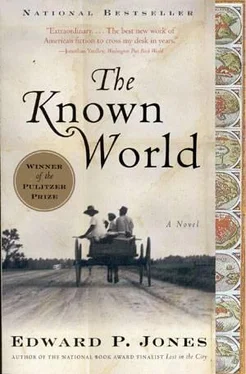“Miss Elston, my horse be dyin on me, and I don’t own a gun, so I can’t put him outa his misery,” Jebediah said. His hat was in front of his chest and he was holding it with both hands. “If I was strong anough, I could wring her neck, but that would take time and she would suffer and so would I. I have a knife, but thas about the same amount of sufferin for us both.”
“Zeus,” Fern said, “please ask Colley to come here. Tell Colley to bring the rifle and a pistol.” When she married the second and third times, Zeus would be with her. Indeed, as she talked to Anderson Frazier that day in 1881, he was inside the house, occasionally looking through the curtains at the backs of their heads. He brought out lemonade to Anderson after Fern offered him some.
“Yessum,” Zeus said.
“Are you planning to make that place out there your home, Mr. Dickinson?” she asked as they waited.
“Your husband been owin me $500, thas all there is to it.”
She would have sighed but that was not in her nature. Sighing was an indication of surrender, of approaching helplessness. She folded her arms.
Zeus came around the side of the house, carrying a pistol, and he was followed by Colley, a man even larger than Jebediah. Colley had a rifle resting on his shoulder. The three men went out to the horse and after Jebediah said something to Colley, the man handed him the rifle and Jebediah shot the horse twice in the head and then handed the rifle back to Colley. Fern watched from the verandah and she could see how the horse simply disappeared in one, two seconds from her treeless view, leaving not one sign that it had ever been there except for a little bothersome dust. Zeus had just stood with his hands behind his back, the pistol in his left hand. They came back and Jebediah asked Fern for the loan of a shovel to bury the beast, and when he was done with the hole, Colley came out with another man and two mules and the three men and the two mules managed to drag the dead horse over and down into the hole. Dickinson covered the hole up. Zeus did not participate because all the work he ever did was in the house, except for a little puttering in Fern’s garden.
Whenever Fern came out and back after that, she found Jebediah sitting on his saddle when he wasn’t standing. He raised his hat as usual. And in all those days her husband never showed up or sent word about his whereabouts.
Oden Peoples, the Cherokee patroller, got tired of seeing Jebediah out there day in, day out and said so to Sheriff John Skiffington. That was the second week Jebediah was there. “Give him a little more time,” Skiffington said. “I’ll be patient with vagrancy but not till the end of my days.” And so near the end of the second week, in broad open daylight when he wasn’t supposed to be on patrol, Oden rode up to Jebediah and pointed his gun at him. Fern watched them from her window.
Jebediah raised his hands without any trouble. He must have said something about his being a free man because Oden shouted something long and hard at him. Oden was on his horse and he got down, never once taking the gun off Jebediah. He roped Jebediah’s hands and waist, a rope of a good six feet, and then he got back up on his horse and he started riding, one hand holding the reins and the other holding the end of the rope that was chaining the walking Jebediah. He had holstered his gun because he felt he didn’t need it anymore.
Fern came out to the road, with Zeus behind her, and they watched together. They watched them for a long time. It was more than ten miles into town but the woman and her slave couldn’t see that far, only about a mile or more, and then the trees and the hills got in the way. She told Zeus to get someone to bring in Mr. Dickinson’s saddle.
As far as anyone could remember, there had never been a colored man in the Manchester County jail. None of them, free or slave, had ever done anything to warrant a stay. The free men in Manchester knew the tenuousness of their lives and always endeavored to be upstanding; they knew they were slaves with just another title. Most crimes and misdemeanors by slaves were dealt with by their masters; they could even hang a slave if he killed another slave, but that would have been like throwing money down a well after the slave had already thrown the first load of money down, as William Robbins once told Skiffington.
Skiffington was most reluctant to put a Negro in a facility that would one day have to be used again by a white man, a white criminal. He resented Oden for putting him in that predicament. He could have chained Jebediah in Sawyer’s barn out back, but Sawyer wanted an arm and a leg for everything, and Skiffington felt the law shouldn’t have to pay that much. And, besides, the law mandated that the sheriff of a county have some control over a prisoner at all times, which wouldn’t have been the case with Sawyer’s barn. So he put Jebediah in the jail cell and decided that everyone would have to live with it.
Jebediah’s free papers said he had been manumitted by Reverend Wilbur Mann of Danville, Virginia. The papers looked right, but Skiffington telegraphed the sheriff down Danville way that he had a suspect Negro and the sheriff telegraphed back that Jebediah was the property of Mann. “Rev. Coming,” the telegram added. In four days Mann was at the jail. He arrived early one morning before Skiffington had even reached the jail and the sheriff found Mann looking in the window, laughing. The reverend was a tall man, very gaunt, and he had the prettiest long blond hair Skiffington had ever seen on a man.
“He belongs to me,” Mann kept saying once they were inside. He produced a bill of sale that showed Jebediah was bought in Durham sixteen years before for $250.
“How he get that free paper?” Skiffington said.
Mann looked abashed. “He wrote em. He can read and write better than you and me.” Mann took off his nice gray hat and set it with both hands on Skiffington’s desk near the Bible. “That was my wife’s doing, bless her name. I told her not to do something like that, but I could never say no to her. He was just a pup back then. She was sweet except for doing things I didn’t approve of.”
Jebediah, in the cell, was silent.
“You should make your wife stop doin work like that,” Skiffington said. “She should know she shouldn’t be doin that. She know what the law is about teaching slaves to read and write?”
“I know,” Mann said. “But she dead now, been dead for two years, left us not long before this damn Jebediah here took off. Bless her name. I got me a real smart wife now-she can’t read nor write so she can’t teach anybody what she don’t know.” He told Skiffington that Dickinson was his first wife’s maiden name. “Ain’t that a kick in the head for you?” the preacher said.
“I don’t know,” Skiffington responded. “I’ll just accept your word that it is.”
“Well, it is. It’s a big kick in the head,” Mann said.
“If you didn’t free him,” Skiffington said, “how he get that free paper?”
“I told you he can read. He can read and write. Can do it better than I can, can’t you, Jebediah? Can cipher like the dickens, too.” He walked over to the bars. “Damn your soul to hell for causin me all this trouble.” Jebediah still said nothing. “And why you wanna go and despoil my wife’s good memory by usin her name to commit a crime with? Huh? You tell me that? Damn your soul.”
“You can take him home anytime,” Skiffington said.
“Lemme go out and get a little mouthful of somethin to eat. I brought my neighbor and he eatin now. We both can get him back where he belong.”
“Fine, that’s good with me.”
Mann had turned to talk to Skiffington but now he went back to Jebediah. “I’m gonna whip your black hide till God tell me to stop, you hear me?” Jebediah stepped back and sat on the pallet on the floor. The cot for the white prisoners had been removed. “Yessiree, you rest up now cause I’m gon tan you good, boy. And then I’ma let you heal, give you time to grow another hide and then I’ma whip that one off you. Then let you grow another, then whip that one off. Go around despoilin my wife’s good name and committin God knows what crimes. Thas all the work you ever gonna have to do again, Jebediah, just grow hides and watch me whip em off you.” Mann took up his hat and then he leaned his head back a few degrees, patted down the front part of the blond hair and set the hat on his head with the same gentleness he would use to set the hat down in a hatbox. “I’ll be back directly,” he told Skiffington and went out the door.
Читать дальше












